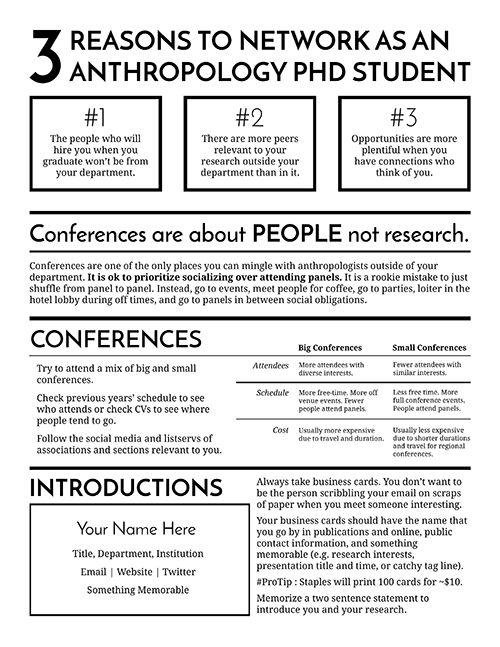I won’t make it to the AAA meeting this year as I am focusing on securing money for dissertation research. #GrantWritingFTW! However, I wanted to share some lessons I have learned over my career that I think can make your AAA meeting (or any conference) more productive for you. Networking, that is meeting new people and making professional connections to people outside of one’s department, has made my academic life easier and more productive. There are many opportunities that would not be available to me if it wasn’t for that one time I met someone for coffee at a conference. So, if you are an anthropology graduate student and you are not actively networking, this is for you.
UPDATE: Another great thing about networking is that people actually read the things you write! My friend and fellow networker, Nick Seaver, points out that “‘networking’ may sound/feel forced, but it’s really just getting to know people! The more you think of it as just normal socializing, the better off you’ll be. (Of course, it can take work to look that laid back ?).” This is important to keep in mind! The advice and tips supplied below are not meant to make you a calculating-networking-machine. Rather, these are methods I have found to reduce my own anxiety about social encounters with colleagues, especially when meeting for the first time. Feeling prepared isn’t about networking efficiency but about making you feel confident to go out and introduce yourself, get to know people, and join conversations.
Some Basics
Why You Should be Networking
#1 The people who will hire you when you graduate won’t be from your department.
#2 There are more peers relevant to your research outside your department than in it.
#3 Opportunities are more plentiful when you have connections who think of you.
Conferences are about PEOPLE not research.
Conferences are one of the only places you can mingle with anthropologists outside of your department. It is ok to prioritize socializing over attending panels. It is a rookie mistake to just shuffle from panel to panel. Instead, go to events, meet people for coffee, go to parties, loiter in the hotel lobby during off times, and go to panels in between social obligations. (more…)



 I have a new publication out in the Theorizing the Web special issue of the open access journal Interface.
I have a new publication out in the Theorizing the Web special issue of the open access journal Interface. 